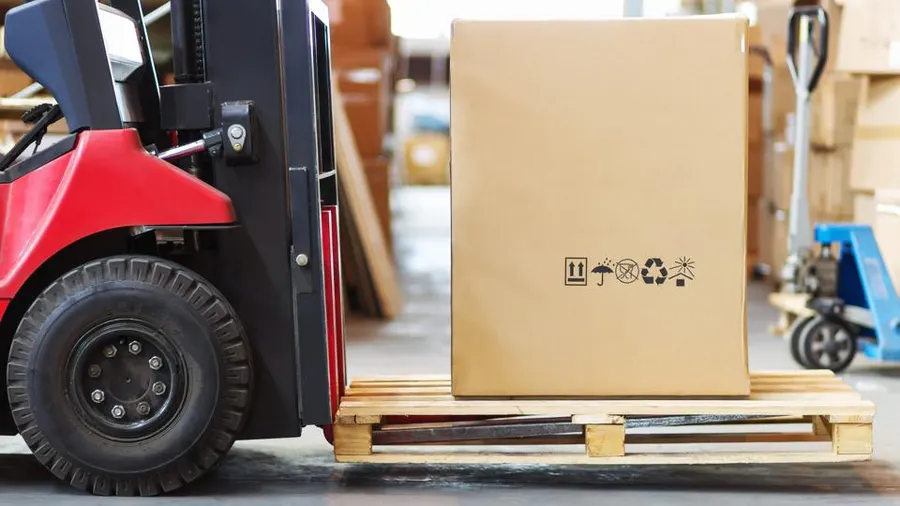Post-College Moving Guide: Tips for a Solo Transition
Navigate your post-college move with ease using our comprehensive guide. Discover tips for planning, budgeting, packing, and settling in without help from family or friends.
Speak With A Shipping Expert And Save 10%
Call (866) 333-8018
How to Move After College Without Help: A Comprehensive Guide
College is an exciting chapter in life, but like all good things, it eventually comes to an end. The next transition is moving from campus life to the real world, where the next batch of opportunities awaits. However, this transition brings many highs and lows as there's much to do, such as finding housing and packing.
Moreover, you may need to move without help from family or friends. This can be difficult for those who have relied on their loved ones in the past. The good news is that most post-college moves are small moves and can be managed smoothly with proper planning and self-reliance.
Start by exploring moving services that can help remove much of the guesswork. Then, outline each step of the process to ensure you get all the crucial details. With these first two steps down, you're ready for the next few tips and tricks we've compiled for you.
Key 2025 Updates for Post-College Moving
- Rising Moving Costs: Due to inflation and increased demand, moving costs have risen by an average of 7-10% in 2025. Booking early and comparing quotes is more important than ever. Consider securing estimates from multiple movers and looking for budget-friendly alternatives like hybrid moving options (a mix of professional and DIY moving) to cut costs.
- Remote Work and Flexible Housing: More companies now offer remote work for entry-level jobs, meaning new grads can move to more affordable cities without job constraints. This flexibility allows for a wider range of housing options, making it easier to balance cost and lifestyle preferences.
- Increased Rental Competition: With more graduates and remote workers moving to major cities, rental availability is tighter than ever in 2025. Start apartment hunting early and consider co-living spaces or short-term leases to secure housing. Using rental apps with real-time alerts can give you an edge in competitive markets.
- AI-Powered Job Matching: New AI-driven platforms help job seekers find positions faster than ever, making relocation decisions easier by suggesting cities with the best job opportunities based on your skills and industry. Exploring these tools can help you make an informed choice before finalizing your move.
- Higher Shipping Delays: Due to ongoing supply chain disruptions, moving companies report longer delivery windows for cross-country moves. If you're using a professional mover, plan for delays and keep essentials with you to avoid inconvenience during the waiting period.
Assess Your Moving Needs: Key Considerations
Figuring out the scale and distance of your move is the first step. Here are some key things to think about to help you assess your moving needs:
- Scale of the move: Start by taking a comprehensive inventory of your belongings. An inventory list will help determine the resources and assistance you need.
- Distance: The distance of your move significantly impacts your planning and budget. A local move within the same city or nearby might be more straightforward and less costly, while a long-distance move requires more thorough planning.
- Budget: Your budget dictates the moving services you can get. Be honest about your finances and focus on your expenses.
- Time constraints: Evaluate your timeline and ensure you know how much time you have to complete your move, if there's a specific date, and how to coordinate your schedule with moving services.
- Physical belongings: The nature and volume of your physical belongings will influence your moving strategy. Consider whether you have large or bulky items, whether you can sell or donate anything, and what kind of packing supplies you'll need.
This proactive approach makes moving easier and helps you stay in control.
Effective Moving Plan: Steps to Success
A successful move hinges on thorough planning. The following will teach you more about the crucial elements of a moving plan.
Create a Detailed Moving Timeline
The initial step is to create a timeline with key milestones and deadlines. Begin this two months before your move.
A few important dates to keep track of include:
- Eight Weeks: Research and book moving services or rental vehicles.
- Six Weeks: Begin sorting and decluttering your belongings.
- Four Weeks: Source packing supplies and start packing non-essentials.
- Two Weeks: Confirm all moving arrangements.
- One Week: Pack essential items and prepare for the moving day.
Stay flexible in your timeline for unexpected events to minimize stress. If you get in a bind consider using a pack and ship service. They can get your items picked up and packed usually within 48 hours.
Budgeting for Your Post-College Move
Another key aspect of planning is creating a realistic budget. If hiring professional movers, get quotes from various companies and consider costs for packing services, insurance, and extra fees. If moving yourself, include truck or van rental, fuel, mileage charges, and a budget for packing materials.
If there's a decent amount of time between moving out and moving in, budget for storage. For long-distance moves, consider expenses like accommodation, meals, and transport. Budget for cleaning in your old and new place. In addition, set aside an emergency fund for unexpected expenses.
Choosing the Right Moving Service: Options and Tips
Picking the best moving service is critical and affects how easy and affordable your move is. By understanding and checking out different service options, you can make an informed choice:
- Small Movers: Small movers manage packing, transportation, and unloading if needed. They will provide materials, labor, and transport. They are great for hands-off custom-packed moves, especially long-distance or moves involving valuable items. Small movers offer top convenience for moves that are less than a truckload.
- Truck rental: Renting a moving truck lets you manage the move yourself. You'll pack, load, drive, and unload. This option is great for folks who are OK with heavy lifting. It is ideal for local or short-distance moves but demands more physical effort and time.
- Portable containers: Companies offer portable storage containers that can be self-filled, which is ideal for DIY moves with no fragile or valuable items. They are suitable for local or long-distance moves, though permits and insurance may be needed for container placement.
To find the best moving service, gather and compare quotes from multiple companies, ensuring all potential fees are included. Check reviews for reliability and service quality.
Additionally, consider what each company offers beyond basic transportation. Some may provide packing services, temporary storage, or insurance. Assess the flexibility of each service, like the ability to change dates or add services if needed.
Efficient Packing Techniques for a Smooth Organized Move
Prioritization and planning can significantly ease the transition. Here, we'll explore efficient packing techniques and strategies for organizing your belongings.
Efficient Packing Techniques: Save Space and Protect Belongings
Packing efficiently saves space and protects your belongings during the move. Here are some tips to help pack:
- Get strong packing tape to secure boxes and labels for organization.
- Place heavier items at the bottom of your box stack to prevent crushing lighter items.
- Avoid overloading any single box. To make lifting easier, distribute heavy items across multiple boxes.
- Use boxes for specific items like dish packs or wardrobe boxes.
For more help, check out furniture shipping services and high-value shipping options for packing and moving valuable or fragile items with specialized care.
Organizing Your Belongings: Tips for a Stress-Free Move
To stay organized, label your boxes using color-coded labels or markers for each room to simplify sorting and unpacking. Label each box with its contents and the respective room. Additionally, mark boxes containing fragile items with a visible "FRAGILE" label to ensure they are handled carefully.
Next, make a detailed master list of all packed boxes, numbering each and listing their contents. Snap photos of valuable or fragile items before packing for insurance and reassembly reference. Also, remember to keep track of essential items for immediate use upon arrival and pack them in a separate, easily reachable box.
Handling the Logistics of Your Move
Moving is all about logistics, and planning for potential obstacles is essential.
Manage Address Changes and Utilities Efficiently
Managing address changes and setting up utilities before your move is a must. Use mail forwarding via the post office to receive important mail reliably. Notify your banks, credit card companies, and employers about your new address to avoid disrupting services or communication. Be sure to contact utility providers to end and start new services; doing so avoids last-minute hassles and fees.
Transporting Your Belongings: Tips for Safe Travel
Transporting your belongings requires careful planning, whether renting a truck or hiring a service. If renting a car, plan routes in advance, noting rest stops and fuel stations. For long-distance moves, consider overnight stays and driving shifts for safety.
When choosing a professional transport service, check their license and insurance to safeguard your belongings during transit. Communicate your needs clearly, including special instructions for handling fragile or high-value items.
Settling Into Your New Place: Quick and Comfortable
Efficiently unpack and set up your space for a quick and comfortable settling-in process. Begin unpacking essential items like toiletries, kitchen supplies, and basic clothing. This way, you will have what you need for daily living right from the start. After the essentials are sorted, focus on arranging furniture and decorating to make the space feel like home.
Building a Support Network in a New City
Building a support network in a new city is invaluable for easing the transition and making your new environment feel more like home. Join local groups or participate in activities that match your interests, like sports clubs, hobby groups, or volunteer organizations. These places offer chances to meet people and build friendships naturally.
You can also leverage social media to find local events and gatherings. Attending community events, like farmers' markets or local festivals, also enables you to integrate and build meaningful connections.
Dealing With Moving Day Challenges: Tips and Solutions
Moving day can be challenging with traffic, weather, or logistics delays. Have a backup plan, keep moving service contacts handy, and map out an alternate route. Pack items securely and mark fragile boxes to reduce the risk of damage. Consider taking valuable or sentimental items in your vehicle.
Fatigue is common on moving days, so stay hydrated, take regular breaks, and have nutritious snacks. Maintaining flexibility and a positive attitude can make a big difference. If something goes wrong, stay calm and adapt your plans as needed.
While there's a lot to it, moving on your own after college is a major milestone. With these tips, you're more than capable of handling it.
Our Latest Moving Tips
View Full BlogTrustpilot Reviews
Aptos, CA 95003 US
Sat: 9:00 am - 3:00 pm
*Pacific Time


